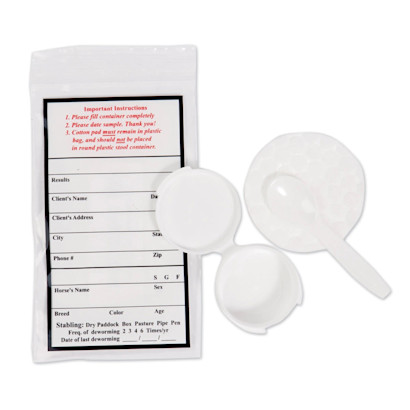Equine Fecal Egg Count - Manure Matters!
Updated June 28, 2024

As grass starts to grow and flowers begin the bloom in the spring, many horse owners will turn to their trusted dewormers like routine. However, before reaching for that familiar dewormer, there’s something else you can do to help protect your horse from parasites - a fecal egg count.
What is an Equine Fecal Egg Count?
A Fecal Egg Count (FEC) measures the number of strongyle and roundworm eggs your horse is passing in each gram of their manure. Having a fecal egg count done for your horse is the first step in planning and executing your horse’s deworming program.
Most veterinarians will perform a FEC for your horse. However, if that’s not an available service, SmartPak offers a mail-away Equine Fecal Test Kit.
Difference Between Fecal Tests for Large and Small Animals
When you send a sample to your veterinarian or independent laboratory, you get back a number like 50 EPG (eggs per gram) or 500 EPG. This is called a quantitative test.
When you take a sample of your dog’s stool to your veterinarian, the clinic runs a qualitative test. A technician performs a fecal flotation to look for the presence of roundworms, hookworms and other parasites. You get back an answer like “yes, your dog has roundworms” or “no, your dog does not have hookworms.”
Why the difference? It’s partly because some of the parasites that dogs and cats get can also be picked up by people. So, we want companion animals that live with us to be completely parasite-free.
But it’s mostly because horses, being grazers, will never be completely free of parasites. However, owners need to know if their horse has a high load of parasites and needs to be dewormed to:
- protect their horse from problems like colic, weight loss, and diarrhea, as well as
- protect the pasture from a high number of eggs being passed onto it.
When to Fecal Test Your Horse

Step 1
Have a FEC done before deworming your horse and schedule this around the active transmission season for your area. It is recommended by the American Association of Equine Practitioners (AAEP) to have FECs performed at least twice per year on every adult horse in the herd.
Parasite transmission season usually starts in the spring and fall in northern climates, so this is a great time to test. Active transmission season varies greatly between regions and for types of worms so work with your veterinarian to figure out the best steps to take in scheduling FECs.
Step 2
Have a second FEC performed 14 days after the first deworming. This is called a Fecal Egg Count Reduction Test (FECRT) and the results help you determine if the dewormer was effective. The AAEP recommends performing a FECRT at least once every year to ensure you’re using effective anthelmintics. Scientists are discovering increasing resistance to commonly used dewormers, so it’s important to make sure there are fewer eggs in your horse’s manure after the deworming.
At the end of the grazing season (typically the fall in northern climates), it’s typically recommended to have another FEC completed. Depending on the results of this test, you may or may not have to use deworming products.
If your horse is under three years old, speak with your veterinarian as young horses follow different FEC and deworming protocols.
Understanding the FEC Test Results
If your horse’s FEC results come back with a low number (less than 200 EPG), this could indicate that your horse has natural resistance to strongyles and may not need dewormer as frequently.
However, if the number is more than 500 EPG, your horse may be a considered a chronic, high-shedder. This is a horse who may not show signs of parasitism but is carrying lots of adult worms that are laying eggs. Therefore, they are spreading parasite eggs all over your facility and infecting other horses. Chronic shedders may need to be dewormed more often than the baseline rate of once or twice a year.
Keep in mind, a FEC is not used to determine parasite burden in a horse or for diagnosing disease. FECs are used to identify the horse as a low, medium, or high shedder.
A negative FEC result does not mean your horse is parasite-free. They still have intestinal parasites in their system; however, the number of eggs being shed is too low to be detected by the FEC. Also, remember that tapeworms are generally not detected by FECs, nor do they indicate the presence of encysted small strongyles.
Video on How to Read Equine Fecal Test Results
To learn more about FECs and for recommendations about sampling and storing, read the AAEP’s Internal Parasite Control Guidelines.